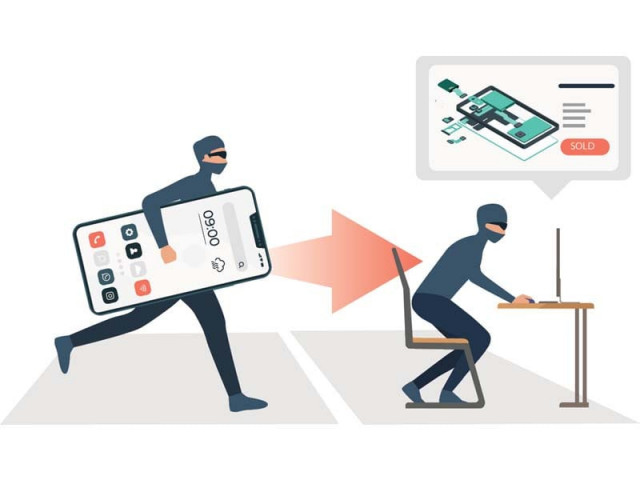Smart criminals for smartphones
Police turn to technology to curb menace of street crime but so do snatchers

Street crime is a perpetual menace in the metropolitan city. Over the years the police have adopted sophisticated mechanisms relying on in-built technology in smartphones to trace snatchers. But here’s the catch - thieves have gotten smarter too!
“Mobile phones these days are very sophisticated and cannot be unlocked easily, thus the criminals are now focussing on selling their parts and accessories on online platforms, mostly OLX.com,” said Ferozabad SHO Aurangzaib Khattak.
Speaking to The Express Tribune, Khattak recalled a cell-phone lead which led his team to multiple arrests in Karachi’s Quaidabad area and Punjab’s Chiniot, Jhang a few months ago. It took the police a month to bust the inter-provincial gang and some 30 mobile phones were recovered.
According to the SHO, the gang had snatched more than 70 expensive smartphones - majority of them iPhones - and successfully managed to sell more than half of them after breaking them up for parts.
The gang was busted after one of its members tried to unlock a snatched iPhone by changing its password while his sim was inserted in the phone, recounted the SHO. The device instantly sent the sim’s number and location to the owner’s iCloud, alerting him of the phone’s whereabouts through the device’s ‘find my iPhone’ application. This helped Khattak’s team trace the activities of the gang online and eventually arrest them in targeted raids.
The arrested suspects had learnt on YouTube how to carefully disassemble smartphones without tampering with any of its valuable parts, explained Khattak.
When asked how mobile phones snatched in Karachi made it to different cities of Punjab, the SHO said the gang relied on various courier services to dispatch stolen items sold online to different cities of Punjab.
Organised crime
Street crime, especially mobile snatchings, are now frequently perceived as organised crime by the police department, said Karachi Police chief AIG Imran Yaqoob Minhas. The police too have upgraded their investigation mechanisms accordingly, he added.
Speaking to The Express Tribune, the top cop conceded that the police force needs to do yet more to curb street crime. The conventional methods no longer work, we have to come up with smarter strategies, said the AIG.
The arrests by Khattak’s team were not unique, said Minhas, adding that multiple criminals have been busted using technology. However, when confronted with complaints by victims, who accuse the police of misbehaving with complainants and dismissing mobile snatching incidents, the AIG claimed that the police have come a long way as far as sensitivity is concerned. But we need to do more to make police more approachable and helpful for citizens, he conceded.
He also agreed that the police have yet a long way to go before it can successfully claim mobile snatchers have been eliminated from the city, despite the Karachi Operation launched in 2013, the AIG raised another matter. He called for the regularisation of used mobile phone markets given that it was difficult to gauge whether used cell-phones were purchased after paying due taxes and customs duty.
The AIG was of the view that regularisation of such markets would eventually lead to reduced snatching incidents as robbers would not be able to sell stolen phones or their parts as easily. It will discourage the sale of stolen or smuggled phones and bring in revenue for the government as well, said the SHO.
The AIG pointed out that while many snatchers are drug addicts resorting to theft to feed their habits, quite a few of them are also just unemployed youths frustrated with their socio-economic realities. “We have 50 per cent repeat offenders but the other half is new to this crime.” Some of the new ones also hail from the privileged classes, noted Minhas, attributing this to unemployment, increase in stress levels and lack of recreational avenues.
Unsafe digital landscape
While there are several benefits of using location services and applications such as ‘find my iPhone’ - as in the case of the Ferozabad Police team - users are also left vulnerable to their personal data being exposed or their safety being compromised when relying on such applications.
These applications come at a personal risk - you have to turn on your location for instance, said digital rights activist Hija Kamran. “This is not advisable for certain groups in Pakistan.”
They are certainly useful in criminal investigations but unfortunately they are also used as a surveillance tool by oppressive regimes, pointed out Kamran, speaking to The Express Tribune. “Journalists, activists, political workers cannot risk turning on their phone locations. But if people are comfortable with sharing their location by all means they may do it. And yeah, it can help them recover stolen phones.”
However, Pakistan lacks data protection laws to reduce the risks of data breach when using location-tracking applications, said Kamran.
Published in The Express Tribune, October 13th, 2021.


















COMMENTS
Comments are moderated and generally will be posted if they are on-topic and not abusive.
For more information, please see our Comments FAQ